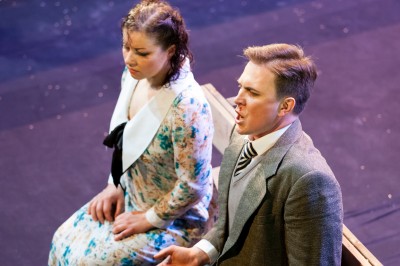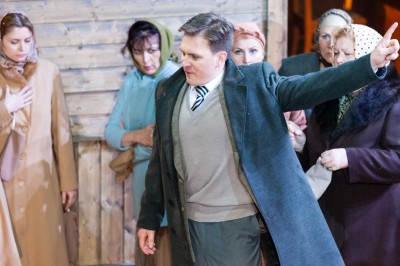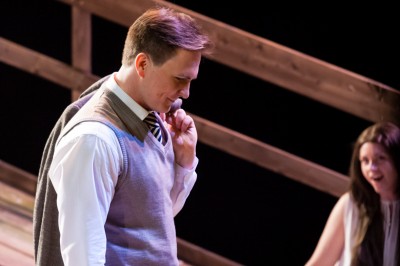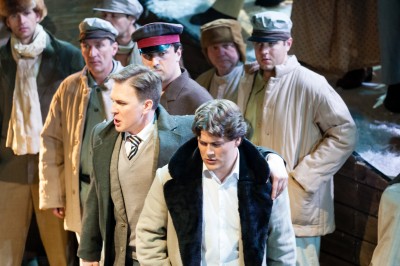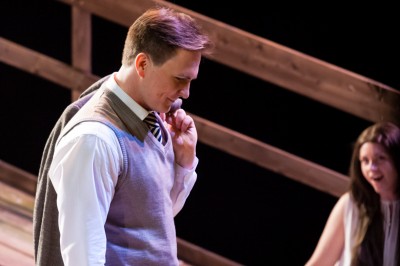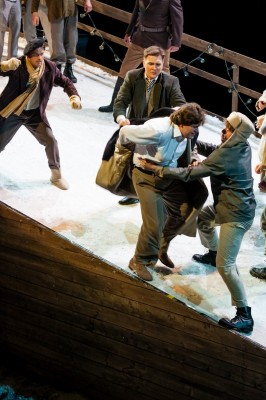Eugene Onegin in Vilnius
By Henning Høholt on 5/10/13 • Categorized as Opera
Eugenijus Chrebtovas, baryton made his role debut as Eugene Onegin at the Lithuanian National Opera May 8th. 2013.
Review by Henning Høholt, photo Ugnius Naudzius
VILNIUS: Eugene Onegin is a well-known example of lyric opera, to which Peter Tchaikovsky added music of a dramatic nature.
The story concerns a selfish hero who lives to regret his blasé rejection of a young woman’s love and his careless incitement of a fatal duel with his best friend. It worked well.
On stage Eugenijus Chrebtovas looked like Eugene Onegin could have been looking, well behaved, seriouse, nicely dressed, vocally, he started visely with caution, but quite soon it seemed that he was feeling safe and at home, and it seemed to me that his fellow players cooperated well, he was on the right pat. It developed very well, and in the end he was very convincing, in fact the last scene became a hit, and for me as critic, it is often the worst scene, but this evening not.
Chrebtovas has a good baryton in the great Lithuanian baryton tradition, it seemed that he has had good advisers. beautiful tune, warmnes and sharpness when needed. Many good details. A very good basic to continue on
. I was happy that i heard this first evening of Chrebtovas. The management has here a good young baryton to develope further, but not too fast.
Chrebtovas was absolutely not alone on stage. Tatyana – Sandra Janusaité has been reading a romantic novel and is absorbed by the story; her carefree sister Olga – , beautiful sung and well played by Jovita Vaskeviciute, on the other hand, wants to join in the celebrations. Madame Larina (their mother) – Inesa Linaburgyte – tells Tatyana that real life is very different from her novels.
Filippyevna (their nurse) – Eugenija Klivickaite, announces that visitors have arrived: Olga’s fiancé Lensky, a young poet, sung beautiful as a young Merunas Vitulskis, and his friend Eugene Onegin, is visiting the area from St Petersburg
. The pair are shown in and Lensky introduces Onegin to the Larin family. Onegin is initially surprised that Lensky has chosen the extrovert Olga rather than her more subtle elder sister as his fiancée. Tatyana for her part is immediately and strongly attracted to Onegin. Lensky expresses his delight at seeing Olga and she responds flirtatiously. Onegin tells Tatyana of his boredom in the country and describes the death of his uncle and his subsequent inheritance of a nearby estate. Filippyevna recognizes that Onegin has had a profound effect on Tatyana
.
Sandra Janusaité was brilliant and convincing as Tatjana, good building up her role from the young innocent girl in her mothers safe home, engrossed in her books, not interested in what was going on around her, but she had time to play piano and sing together with her sister Olga – splendid, flirting. Sandra Janusaité´s performing of the demanding famouse letter scene was, to me, outstanding. – When she in the end enters, as the wife of Prince Gremin, her character was build up to that role figur, and she still had the power to admit that she loved him, and continued to reject him, since she was married to Prince Gremin. We trusted in her and Eugene Onegin together in that role.
Merunas Vitulskis sung a beautiful young Lenskij, his famouse arioso in the beginning “I love you Olga” and later before the duel his Aria: “Kuda, kuda vï udalilis”, was very good. – Unfortunately we have then come to one of the few minor problems in this new (2012) Eugene Onegin production in Vilnius.
The duel: In Pushkin‘s time, the early 19th century, duels were very strictly regulated. A second’s primary duty was to prevent the duel from actually happening, and only when both combatants were unwilling to stand down were they to make sure that the duel proceeded according to formalised rules. A challenger’s second should therefore always ask the challenged party if he wants to apologise for his actions that have led to the challenge. In Eugene Onegin, Lensky’s second, Zaretsky, does not ask Onegin even once if he would like to apologise, and because Onegin is not allowed to apologise on his own initiative, the duel takes place, with fatal consequences. Zaretsky is described as classical and pedantic in duels.
The regisseur, the young talented, Vasilij Barchatov, who i must admit in this staging has done some very well working renowations in his staging.
“Unfortunately he lost the dramatic highlight of this opera”.
In Eugene Onegin the duel between Onegin and Lenskij is the dramatic highlight. Only followed by Tatyanas refusing of sending Onegin away in the very last moment. Up on making this as a kind of a brawls involving other sitizens who has come to attend what they expected should be a duel, then Barchatov lost the dramatic highlight, who is making the change in the whole opera. What a pitty.
However, I would like to describe the regi in combination with the some time well functioning scenography both parts by Barchatov, and it was well followed up by the costumes by Zinovij Margolin.
The first, and second act is going on in something looking like a kind of a garden dominated by a hill behind a house that looked like a wintergarden/ boathouse. As the garden, where threes, (which are described in the text), are 100% missing. It is like situated down to a lake, but out of sight, but we feel its closeness because of the second acts choire girls, has been to bathing nymphs, well dressed, but still running in and out of the lake, and with wet hair, but not wet costumes. But it works it gives a good feeling, and we are trusting in it.
However, when then the wintergarden/boathouse in the letter scene is complitely looking the same, Except for a too large moon, which is not moving, – the stage shall function like Tatyanas beed room, it dont function so well. Before that it is elegantly done to let the activityes going on inside, and outside at the terrasse.
The nameday ball for Tatyana: When we came to the celebration ball given for Tatyanas nameday, it was put to an outdoor evening with amusing snow activityes, it functioned, still that I was missing the danced waltz and the ballet. Because in the history it is describen: A ball is being given in honour of Tatyana, whose name day it is
. Onegin is dancing with her. He grows irritated with a group of neighbours who gossip about him and Tatyana, and with Lensky for persuading him to come to the ball. He decides to avenge himself by dancing and flirting with Olga. Lensky is astounded and becomes extremely jealous. He confronts Olga but she cannot see that she has done anything wrong and tells Lensky not to be ridiculous. Onegin asks Olga to dance with him again and she agrees, as “punishment” for Lensky’s jealousy. In the snowball game, the audence didn´t really catch the flirting between Olga and Onegin, who gives Lenskij the basc for being jalouse, therefore it didn´t give any excuse for the duel, and when the duel then dont functioning the dramatic height of the opera was lost.
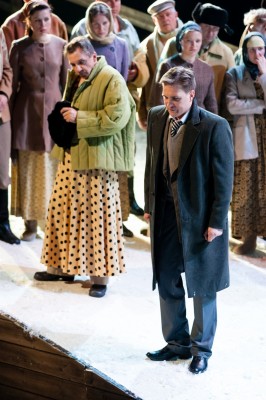
Vytautas Kurnickas (left) as Monsieur Triquet andd Eugenijus Chrebtovas as Onegin, photo Ugnius Naudzius
Furthermore: The elderly French tutor Monsieur Triquet – Vytautas Kurnickas – sings some couplets in honour of Tatyana, that was Ok done, but he was dressed up in a strange way in a womans clothes, and with a fur stola, I dont find out where the regisseur have got that strange idea from, but after this the quarrel between Lensky and Onegin becomes more intense. – But still we have not seen any flirting and dont understand. Lensky renounces his friendship with Onegin in front of all the guests, and challenges Onegin to a duel, which the latter is forced, with many misgivings, to accept. Tatyana didnt collapse and the snowparty ended in a kind of not understandable confusion. – However the idea of presenting the ball outside in the cold snow was a good idea, just that the regisseur didn´t manage also to tell the importent part of the history at the same time. After the socalled duel/brawl. – Eugene Onegin is travelling away.
Last act: When Onegin returns, we are used to that this is to a ball by Prince Gremin, – Liudas Norvaisas – . This scene was moved to a Railway (or buss(?)) station
. Where a reception party was going on. It looked in a way good, deliciousely with costumes in the matching grey colors, with read accents. The Polonaise was played, but we didn´t get the festivitas feeling, that layes in the music, nor enjoyed any Polonaise danced. . After this party and Prince Gremin´s beautiful aria, well sung.-
– A small detail. Professional advice: When waiters shall look like they are “waiters”, they carry the serving tray on the left hand, the same hand that carry the hand piece over the arm, not the serving tray in the right hand, as done here, and the hand piece disturbing the way of working on the left arm. It looks all wrong out.
The empty station was the goodbye place between Tatyana and Gremin, and Onegin arrives, and Gremin can follow it all from the next platform. But in fact this became a good dramatic ending where the young couple, Sandra Janusaité and Eugenijus Chrebtovas was at their very best.
The demanding choire parts was taken very good care of by the good choire at the Lithuanian National Opera, and the Orchestra played quite well Conducted by Robertas Servenikas.

